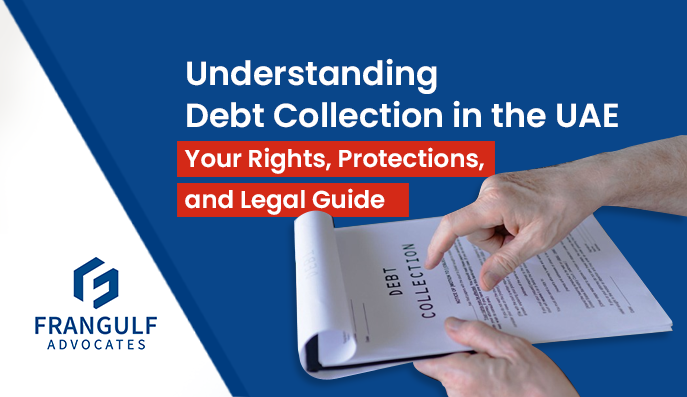Understanding Debt Collection in the UAE : Rights, Protections, and Legal Guide

Table of Contents
- How Debt Collection Works in the UAE
- Key Laws Every Debtor Should Know
- What the Central Bank Requires From Debt Collectors
- Your Rights as a Debtor in the UAE
- What Debt Collectors Can and Cannot Do
- Travel Bans and Debt in the UAE
- How Long Can Creditors Pursue You?
- Understanding the Debt Collection Process
- Tips for Handling Debt Collectors
- Need Help With Debt? Consult Our Legal Experts
- Civil vs Criminal Debt Cases
- Options for Settling Your Debt
- Where to File Complaints if Your Rights Are Violated
- Conclusion
- Got a Legal Question?
Dealing with debt collectors can be stressful, especially in the UAE. Whether it’s unpaid credit cards, personal loans, or bounced cheques, knowing your rights under UAE debt collection laws can protect you from harassment, unfair practices, and unnecessary travel bans. Understanding these rules helps you respond confidently and avoid legal trouble.
How Debt Collection Works in the UAE
The UAE has strict laws designed to protect both creditors and debtors. These rules ensure debt recovery is fair, legal, and transparent. Knowing how the system works allows you to negotiate effectively and safeguard your rights if you owe money.
Key Laws Every Debtor Should Know
Several laws regulate debt collection in the UAE:
- Civil Transactions Law (Federal Law No. 5 of 1985): Outlines provisions on contracts, obligations, and remedies for unpaid debts.
- Commercial Transactions Law (Federal Law No. 50 of 2022): Regulates business-related debts, commercial loans, and dispute resolution mechanisms.
- Federal Decree-Law No. 15 of 2024: Governs debt collection by federal entities, including notifications and enforcement procedures.
- Consumer Protection Law: Protects individuals from harassment and unfair practices during debt recovery.
These laws ensure that creditors follow proper legal procedures and cannot harass or intimidate debtors.
What the Central Bank Requires From Debt Collectors
The Central Bank of UAE (CBUAE) has strict rules for banks and financial institutions when collecting debts:
- Staff must act professionally and be trained on consumer rights.
- Communication must be reasonable, respectful, and documented.
- Debtors must be fully informed about amounts owed, fees, and repayment options.
- Personal and financial data must be protected within the UAE.
Your Rights as a Debtor in the UAE
If you owe money, the law grants you several protections:
- Fair Treatment: No threats, intimidation, or harassment.
- Debt Verification: Right to request details and confirm amounts.
- Dispute the Debt: Challenge incorrect or invalid debts.
- Privacy: Debt collectors cannot disclose your information to third parties.
- Negotiation: Request payment plans, settlements, or restructuring options.
- Legal Representation: Hire a lawyer or file counterclaims. Consider Frangulf for legal support.
- File Complaints: Report violations to the Central Bank, Ministry of Economy, or local courts.
What Debt Collectors Can and Cannot Do
They Can:
- Contact you about legitimate debts
- Send written notices and payment requests
- Offer payment plans
- Report debts to credit bureaus
They Cannot:
- Threaten violence or harassment
- Misrepresent debts or claim to be government officials
- Contact your employer, neighbors, or relatives
- Post information about your debt publicly or on social media
Travel Bans and Debt in the UAE
Creditors may request a travel ban if you owe more than AED 10,000.
- How to check: ICA online portal, Dubai police, or local courts
- How to remove: Settle the debt, obtain confirmation, get a court order, and verify system updates
Travel bans can create serious problems, so it’s crucial to act promptly if one is imposed.
How Long Can Creditors Pursue You?
The statute of limitations determines how long a creditor can legally recover a debt:
- Civil debts: 3–15 years
- Commercial debts: 3–5 years
- Bounced cheques: 3 years
- Personal loans: 3–15 years
Note: Any payment or acknowledgment of the debt can restart the limitation period.
Understanding the Debt Collection Process
Debt collection in the UAE usually follows these stages:
- Initial Contact: Notification and request for payment
- Verification: Confirm debt legitimacy and request documentation
- Negotiation: Explore payment plans, lump-sum settlements, or restructuring
- Pre-Legal Action: Final notices and court warnings
- Legal Proceedings: Filing, hearings, and judgment
- Enforcement: Wage garnishment, asset attachment, or travel bans
Tips for Handling Debt Collectors
- Verify the debt and collector’s legitimacy
- Keep records of calls, messages, and letters
- Communicate in writing to create evidence
- Negotiate payment plans or settlements when possible
- Hire a lawyer if the case is complex
- Protect assets and plan for long-term financial stability
Need Help With Debt?
Consult Our Legal Experts
Facing debt collectors can be overwhelming, but you don’t have to navigate it alone.

Civil vs Criminal Debt Cases
Civil Debt: Includes credit card defaults, personal loans, or business debts. Consequences may include court judgments, wage garnishment, or travel bans—but not jail.
Criminal Debt: Includes bounced cheques, fraud, or forgery. Consequences can include fines, imprisonment, criminal records, and automatic travel bans.
Options for Settling Your Debt
- Lump Sum Settlement: Pay a reduced amount immediately
- Payment Plan: Monthly installments over time
- Debt Restructuring: Modify interest rates or repayment terms
- Hardship Programs: Temporary relief for emergencies or income loss
Where to File Complaints if Your Rights Are Violated
- UAE Central Bank: For banks and financial institutions
- Ministry of Economy: For consumer protection issues
- Dubai Economy: Mediation and investigations
- Local Courts: Counterclaims and damages
- Police Authorities: Threats, fraud, or impersonation
- Legal Firms: Representation for complex cases
Conclusion
Understanding UAE debt collection laws empowers you to protect your rights, avoid harassment, and resolve debts responsibly. Always verify debts, maintain records, communicate in writing, and seek legal assistance when needed. Being informed is your best protection in 2025.
Got a Legal Question?
Can I go to jail for unpaid debt?
No for civil debts (credit cards, personal loans). Yes for criminal debts (bounced cheques, fraud, forgery).
How do I verify a debt is legitimate?
Request documentation: original agreement, breakdown of amounts, proof of collector’s authority, and confirmation the debt is within statute of limitations.
Can I get a travel ban for unpaid debt?
Yes, if you owe over AED 10,000 and the creditor gets a court judgment. It’s not automatic.
Should I hire a lawyer for debt issue?
Consider it for court action, disputed debts, harassment, substantial amounts, or complex settlements. For professional legal assistance with debt matters in the UAE, contact Frangulf Legal Consultancy at https://frangulf.ae/
Facing a Legal Challenge? We’re Just One Call Away
Confidential, expert, and results-driven legal advice.







